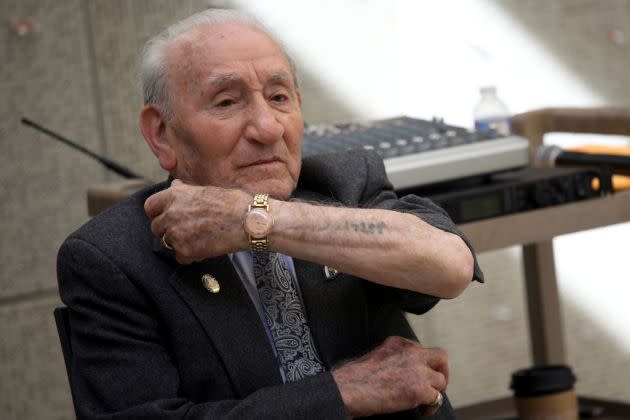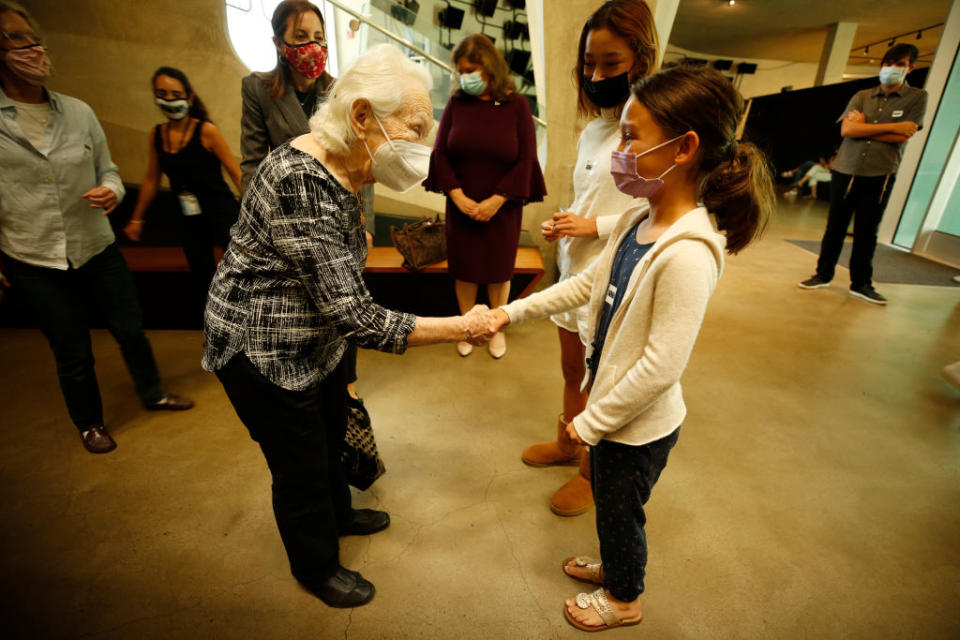How LA’s Holocaust Museum Uses Education and Conversations With Survivors to Fight Antisemitism

“I’m a bit sleepy tonight but when I awaken, I’m going death con 3 On JEWISH PEOPLE.” – Kanye West
This statement shocked many people last October, but to those of who work at Holocaust Museum Los Angeles it was another call to action.
More from Variety
As CEO of the oldest Holocaust museums in the United States, I did what I always do when antisemitic tropes and statements occur in our community: I reached out to the offending individual or group.
In this instance, I offered Mr. West — under the condition of no press or photo ops — the opportunity to meet with me, our educators and Holocaust survivors. We wanted to explain how the Holocaust, began with the type of words he spoke.
A meeting never materialized.
This is, sadly, an ever-present reality today in the world of Holocaust education: The constant need to fight a dramatic surge in antisemitism.
When a global celebrity participates in this kind of language, the damage is tremendously magnified. It normalizes speech that has always been present but was hidden in smaller circles, underground. We see it far too often in schools. In the last few years, we have responded to multiple situations where teenagers caused great harm through ignorant and hateful statements or actions.
A high school in Orange County approached us after students were photographed committing Nazi salutes and creating swastikas. We responded with education and with conversations. Both parents and students participated as we took the time to reach the students. Again, the role of survivors in this process was invaluable.
The urgent call for education is not waning.
We see community after community ripped apart by neo-Nazi style propaganda and hatred. Each time we do the hard and time-consuming work of healing and restoring our community. We are not alone in this work. We have forged partnerships with the Jewish Federation, the American Jewish Committee and the Anti-Defamation League while building relationships with elected officials locally and statewide to combat and help educate against antisemitism, hatred and bigotry. We work with the LAPD on officer training and combatting hate crimes. Our museum has created DEI programs for corporations, providing education and training on hate speech and antisemitism. The museum is also part of the Stand Up to Jewish Hate Campaign, partnering with other prestigious organizations including the NFL, NBA, PTA and NAACP.
The dramatic rise of hate speech and the dehumanizing of “others” has not just impacted Jewish people. Our museum supports many other communities in need of allies. Holocaust Museum L.A. has created partnerships with other social justice organizations including the Center for Asian Americans United for Self-Empowerment (CAUSE), Hispanas Organized for Political Equality (HOPE), Los Angeles Urban League and Jewish Center for Justice.
With those partners, we inaugurated Holocaust Museum L.A.’s Building Bridges program, a panel discussion to foster communication and cooperation and find common ground between diverse communities. Since launching virtually in 2020 in the wake of George Floyd’s murder, Building Bridges has become a regular in-person series at the museum and has addressed Civil Rights, Gay Rights, immigration and other social and political topics.
To create higher engagement with younger students in our communities, additional initiatives include expanded art, film and theater workshops connecting students and survivors and an active HMLA teen board comprised of local high school students. The teen board members connect directly with survivors for events and conversation. Earlier this year the board hosted its first teen summit, F.A.C.E. (Fight, Address, Confront End). The summit brought young people from across Southern California to discuss antisemitism and learn the tools to combat it..
We initiated an audio tour for children ages eight and up. Narrated by award-winning actress Mayim Bialik, it is a 30-minute tour through the museum and helps children understand the Holocaust in a simple and direct way.
Our public programs have grown to include more survivor talks, book events, films and theater productions. Holocaust Museum LA has had survivors share their stories since the museum’s inception in 1961. With a shrinking survivor population, the museum inaugurated the “Descendants of Remembrance” program, preparing the children and grandchildren (2gs and 3gs) of survivors to tell their parents’ stories so that they will not be lost. In addition, the Museum has launched a Survivor Wisdom Project to collect meaningful messages from the survivors that they want to leave us with. As a grandchild of survivors, I understand on a very personal level the need to preserve these histories.

The latest initiatives have been based around expanding the use of technology in the museum experience. Holocaust Museum LA launched the West Coast debut of the Shoah Foundation’s virtual survivor project, providing visitors the opportunity to converse in real time with a hologram of a Holocaust survivor. This is a permanent exhibit in the museum.
In the last year the museum became part of the Bloomberg Connects mobile guide, allowing access to audio tours, gallery exploration, information about survivor stories and the museum’s unique collection of artifacts from anywhere across the globe. We host an acclaimed film series every summer and we have worked with numerous studios and film distributors both in providing historical support for accuracy in films and hosting high-profile preview screenings. The museum has even provided archival and educational support to an ever-growing slate of feature films and documentaries that reach hundreds and thousands of viewers.
Despite our work, “Kanye is right” is how many responded to his words of hate.
We will continue to isolate voices of hate which don’t seek to learn the painful truth of how simple words can lead to mass devastation and murder. That is a promise I made to my grandparents and one that all of us at Holocaust Museum LA have made to every survivor.
The survivor population sadly, is shrinking and our work will inevitably be much harder. But Holocaust Museum LA is determined.
We will tell your story. We will teach. We will remember.
This article is part of Variety’s Antisemitism and Hollywood package.
Best of Variety
Sign up for Variety’s Newsletter. For the latest news, follow us on Facebook, Twitter, and Instagram.

